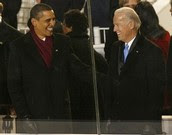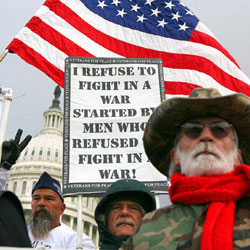This from Dan Froomkin’s op-ed piece in the Washington Post:
'Charlie Savage writes in the Boston Globe about Cheney's relentless quest to expand executive power: "The Constitution empowers Congress to pass laws regulating the executive branch, but over the course of his career, Cheney came to believe that the modern world is too dangerous and complex for a president's hands to be tied. He embraced a belief that presidents have vast 'inherent' powers, not spelled out in the Constitution, that allow them to defy Congress.
'"Cheney bypassed acts of Congress as defense secretary in the first Bush administration. And his office has been the driving force behind the current administration's hoarding of secrets, its efforts to impose greater political control over career officials, and its defiance of a law requiring the government to obtain warrants when wiretapping Americans. Cheney's staff has also been behind President Bush's record number of signing statements asserting his right to disregard laws.
'"A close look at key moments in Cheney's career -- from his political apprenticeship in the Nixon and Ford administrations to his decade in Congress and his tenure as secretary of defense under the first President Bush -- suggests that the newly empowered Democrats in Congress should not expect the White House to cooperate when they demand classified information or attempt to exert oversight in areas such as domestic surveillance or the treatment of terrorism suspects."
'Seymour Hersh writes in the New Yorker : "In interviews, current and former Administration officials returned to one question: whether Cheney would be as influential in the last two years of George W. Bush's Presidency as he was in its first six."
'Thus far, the vice president would appear to be up to his normal tricks. Hersh writes: "The Administration's planning for a military attack on Iran was made far more complicated earlier this fall by a highly classified draft assessment by the C.I.A. challenging the White House's assumptions about how close Iran might be to building a nuclear bomb. . . .
''"A current senior intelligence official confirmed the existence of the C.I.A. analysis, and told me that the White House had been hostile to it. The White House's dismissal of the C.I.A. findings on Iran is widely known in the intelligence community. Cheney and his aides discounted the assessment, [a] former senior intelligence official said."
*_*_*
Meanwhile, as David E. Sanger writes in the New York Times:
'"Mr. Bush spent 90 minutes with commission members in a closed session at the White House two weeks ago 'essentially arguing why we should embrace what amounts to a "stay the course" strategy,' said one commission official who was present."'
*_*_*
Ah, yes------
Ignoring the facts worked so well for this administration the last time they were bent on waging a war.
So, they just keep doing it.
The definition of neurosis:
'Repeating the same action over and over and expecting a different outcome NEXT time.'
Subscribe to:
Post Comments (Atom)

































2 comments:
Let's just assume for a minute that Cheney is right (He not, but for argument.....), and that our pResident (ptui!) truly needs such powers.
If this is really true, then the war on terror is over. We lost.
yep.
there are lots of precedents:
Hitler's Germany and Stalin's Soviet Union spring to mind.
Post a Comment